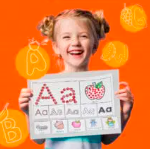Helping children learn letters and sounds is an important step toward reading success. When taught in fun, meaningful ways, young learners can develop strong literacy skills that set the foundation for lifelong learning. Here are some friendly and effective strategies educators and caregivers can use to support early reading development.
Start with Name Recognition Begin by teaching the letters in each child’s name. Children are naturally curious about their own names, which makes this a great starting point. Use name tags, cubby labels, or art projects that incorporate letters from their names to build early letter awareness.
Use Multi-Sensory Activities Engage children with activities that involve seeing, hearing, and touching. Sandpaper letters, playdough shapes, or tracing letters in sand trays can make learning more engaging. Singing alphabet songs or using movement games where children jump or clap for different sounds also reinforces learning.
Introduce Letter Sounds with Familiar Words Pair each letter with a word that is meaningful to the child. For example, “B is for ball” or “M is for mom.” This connection helps children link letters to the sounds they hear in everyday speech. Repetition and storytelling can help reinforce these sound-letter connections.
Read Aloud Often Storytime is a powerful tool. When reading books aloud, point to letters, highlight beginning sounds, and ask questions like, “What sound does this word start with?” Choose alphabet books and rhyming stories to make the experience fun and educational.
Play Letter and Sound Games Make learning playful with matching games, letter hunts, or sound bingo. Use magnetic letters on a board or fridge to spell simple words and practice phonics. These activities not only reinforce learning but also build confidence and joy in reading.
Model and Encourage Sounding Out As children begin to recognize letters and their sounds, encourage them to sound out simple words. Use gentle guidance and celebrate their efforts. Modeling the blending of sounds to form words helps them understand how reading works.
Keep It Positive and Fun Learning letters and sounds is a journey, not a race. Celebrate small successes and keep a positive tone. Smiles, praise, and encouragement go a long way in building a child’s motivation and love for reading.
With these strategies, educators and caregivers can create a joyful and effective learning environment that supports early literacy skills and helps every child feel confident and excited about reading.


